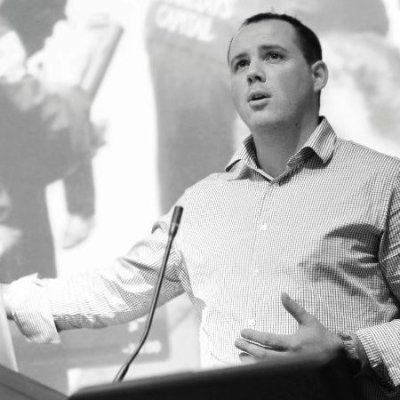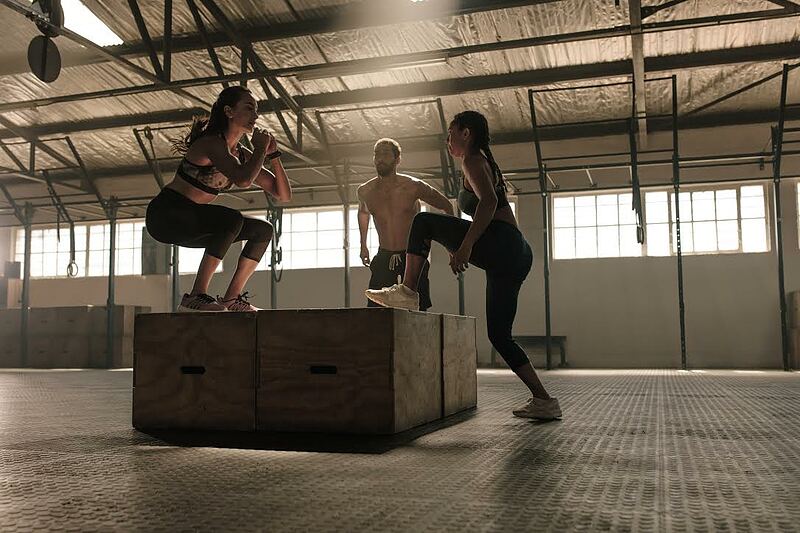School’s in Session – 3 Life Lessons I Learned from the World’s Best Coaches
Coach DevelopmentABOUT THE AUTHOR

Fergus Connolly
Dr. Fergus Connolly is the Director of Performance and Director of Operations at University of Michigan Football and the author of Game Changer. He has worked with teams in the NFL, NBA, Premier League soccer, the Welsh national rugby team and British and American Special Forces.
Here are three invaluable things this Tribe of Mentors (hat tip, Tim Ferriss) passed on to me, which I’ve in turn shared with my fellow coaches and the athletes we’ve been privileged to work alongside.
// Lesson #1: There’s No Such Thing as Discipline (Only Self-Discipline)
Strolling through a top secret military base, I debated a great dichotomy in elite performance with a highly decorated commander: how do you balance discipline and talent and structure with fluidity? The great All Black Tana Umaga had just begun his coaching career and when he called me to talk about coaching methods, I’d asked him a similar question: How do you install a disciplined game plan and yet still allow players to express themselves? Few teams can manage this well, but great ones find a way.

Tana’s answer was simple: include the players in any disciplinary process.
As the commander and I walked from one compound to the other in the crisp spring air, he explained to me that in the elite units, the challenge is to create leaders who can think for themselves. In most (but not all) cases, the operator they are preparing has been taught to take orders and instructions without question up until they get to his unit. However, especially as conflict has become much more unconventional, a need has arisen to develop independent operators who can think and act with ingenuity in highly unpredictable situations. He explained the balancing act of discipline and the freedom to improvise through the analogy of a piece of litter [aka trash].
Firstly, there is no such thing as external discipline with elite performers, only self-discipline. If the operator doesn’t do it because they choose to, then they are not thinking independently. If operators just do what they are told unquestioningly, it’s merely rote learning at that point and there is no understanding of the value of the action. When the instructor isn’t there, the real purpose of the lesson is not learned.
Discipline is what you do at the behest of someone else, while self-discipline is when you do it on your own initiative.
Secondly, as a leader, you can’t control everything. You should provide a framework for only some things and give the operator limited guidance so they can decide how best to achieve the aim in any given situation. This is why in all my consulting work I emphasize principles and heuristics, never rules.
We stopped walking for a moment as the commander bent down to pick up a piece of a torn Styrofoam cup that was lying by the edge of the path. “We have a rule that you never walk past a piece of litter,” he explained. “The purpose is simple. We tell our operators that even when you’re out with friends, you are different. Never walking past a piece of litter is a reminder that you are not above anyone else. You’re a servant and must always remember who you are.”
// Lesson #2: Never Let Your Standards Drop
Evening fell at Euxton Lane near Chorley, Bolton in the North of England. All the players and most of the staff had left the Bolton Wanderers training ground. But one coach stood alone, poring over his immaculately kept notebooks. With painstaking detail, he drew out the training drills he had coached earlier that day. He scribbled small observations about the success of this drill and that game, changes he’d made, and how the players had responded.

Ricky Sbragia was one of the coaches responsible for the development of possibly the most successful groups of Premier League youth players ever: Manchester United’s famed “Class of ‘92.” This group included David Beckham, Ryan Giggs, Gary and Phil Neville, Paul Scholes, Wes Brown, Nicky Butt, Keith Gillespie, and Robbie Savage, who all came through the Manchester United training system. At Bolton Wanderers, he continued the same meticulous habits he honed while teaching the Class of ‘92.
Ricky taught me the importance of never letting your standards drop. After Sam Allardyce left Bolton, he was reassigned to managing the reserves. Unlike many ego-driven coaches who would’ve bristled at this role change, Ricky maintained the same standards and practices with the reserves as he had at every first team practice during Sam’s time and with the future Manchester United Academy stars. Every night after practice, he stayed later than everyone else, assessing what had gone well, what he could change, and how the players could improve the next day.
Ricky demonstrated the importance of always being a consummate professional. No matter what your role or level is, you can have a positive impact on those around you.
Success leaves clues. You just have to notice them. I always looked to copy the habits of those who had a history of winning. The best are constantly looking to improve. Occasionally, in adopting habits of the successful people in your area, you miss the real purpose of the habit. It took me years to realize what I really learned from Ricky.
He wasn’t keeping a routine for its own sake, but was also seizing every opportunity to progress as a coach and learn more. What some may have seen as a demotion, he viewed as an opportunity. What some would’ve reacted to with bitterness, he responded to with renewed enthusiasm. The environment, players, and duties had changed, but he regarded this as a chance to get better.
We all have setbacks. It’s how we choose to frame them that determines what happens next. We can decide to either moan and groan or resolve to compete against and improve ourselves, regardless of the situation.
// Lesson #3: Humility is at the Core of all Great Leaders
I crumpled my tired body into the car. Pat Howard had been the head coach at Leicester Tigers years before and now had moved on to reinvigorate Cricket Australia’s fortunes. He’d brought me in to consult with the organization for a few weeks. Of all the general managers I’ve been around, Pat was one of the most impressive. At times I’d forget how young he was, considering he’s played on two continents, earned twenty caps for Australia, coached the Tigers, and went on to manage one of Australia’s most storied national organizations.

Throughout the week, I’d presented on two main topics: “Thinking Differently – Successful Innovation in Sports” and “High Performance Habits – Lessons from Other Sports.” The most enjoyable part of my experience was the engagement and interaction with the experienced coaches. Rod Marsh and Greg Chappell were two of the most famous and legendary figures in cricket. They were also the two who were most involved in the team’s activities and discussions. To have played and coached as much as they had, I’d have forgiven them if they hadn’t wanted to listen to me coming in with all these new-fangled ideas, but it was actually the complete opposite.
Back in the car, Darren Holder was driving me to the airport. Greg, in a genuinely touching act, had given me a book, First Tests: Great Australian Cricketers and the Backyards That Made Them by Steve Cannane, as a gift before I left. I was impressed and appreciative. As we pulled out of the Cricket Australia parking lot, I asked Darren for his address so I could return the favor when I got back to the States. He leaned over and pointed up at the road sign. It read, “Greg Chappell St.” The whole two weeks, a man who hadn’t needed to learn any more about the game took part in the conversations with me though it was his first professional opportunity.
I’d witnessed true humility from a legend whose name was on the street where he went to work each day.
This post is an exclusive excerpt from Fergus’s new book. To read more, order your copy of 59 Lessons: Working with the World’s Greatest Coaches, Athletes, & Special Forces.
Are you a better coach after reading this?
More coaches and athletes than ever are reading the TrainHeroic blog, and it’s our mission to support them with usefull training & coaching content. If you found this article useful, please take a moment to share it on social media, engage with the author, and link to this article on your own blog or any forums you post on.
Be Your Best,
TrainHeroic Content Team
HEROIC SOCIAL
HEROIC SOCIAL
TRAINING LAB
Access the latest articles, reviews, and case studies from the top strength and conditioning minds in the TH Training Lab

